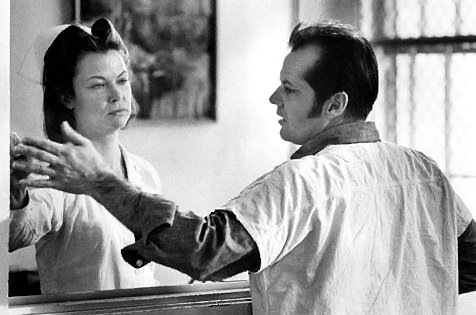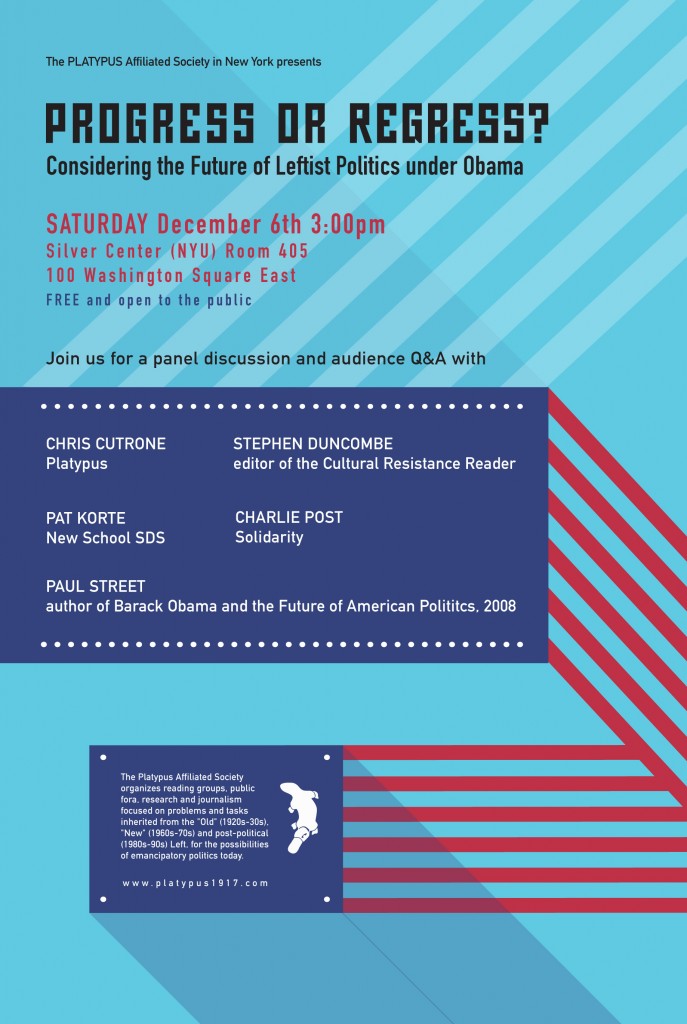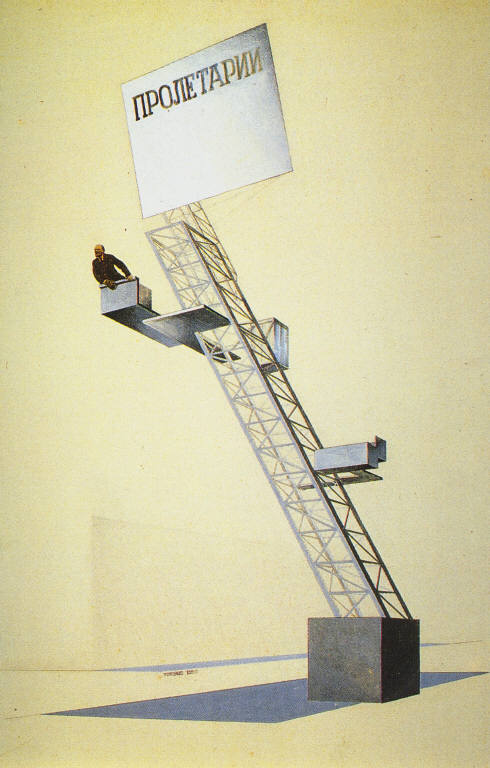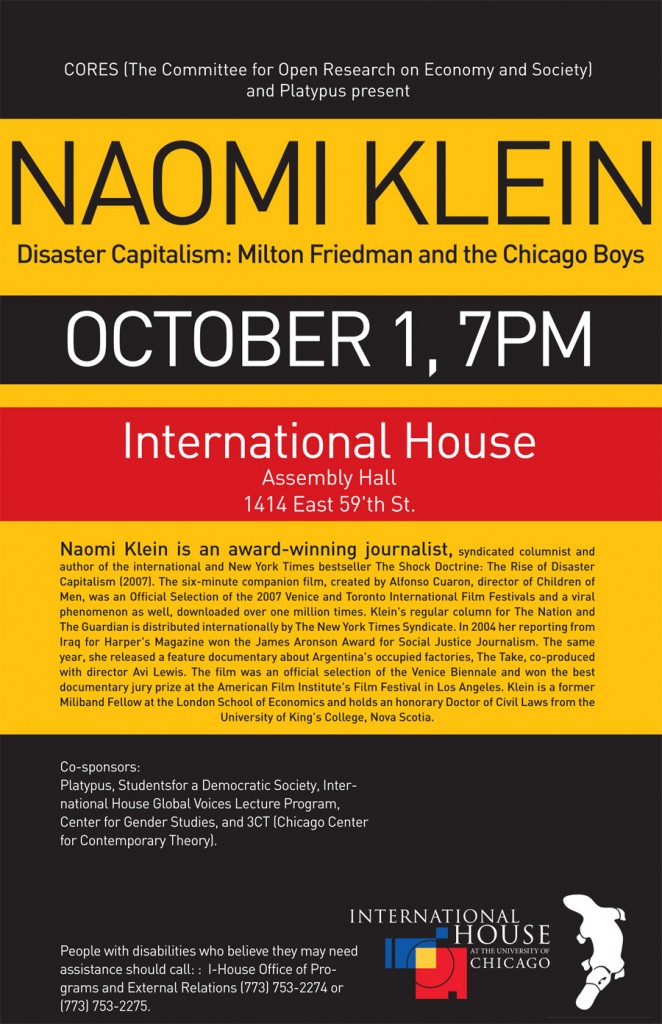The Platypus Synthesis: History, theory, and practice
Presented at the Platypus Affiliated Society 1st annual international convention, Chicago, June 14, 2009. (Audio recording.)
History, theory
Chris Cutrone
I WANT TO BEGIN, straightaway, with something Richard raised, on which I would like to try to elaborate, by way of properly motivating the more “positive” aspect of Platypus’s theory. Not how we are misrecognized, as either neoconservatives, crypto-Spartacists or academic Left-liberals, and what this says “negatively” about our project, as if in a photonegative, as Richard has discussed, but rather how we positively think about the intellectual content of our project.
Let me begin with a thought experiment: What if the Spartacist critique of the 1960s New Left and Moishe Postone’s critique of the New Left, as disparate and antithetical as they might appear, were both correct? In other words, what if, paradoxically, the problem of the 1960s New Left was that it was simultaneously “too traditional” and “not traditional enough” in its Marxism?
What if the Spartacists were right that Stalinism and Trotskyism (and Bolshevism more generally) were not to be conflated, as they were in both Stalinophilic New Leftism, of Maoism and Che Guevarism, etc., and Stalinophobic neo-anarchism, Situationism, etc.? And what if Postone was correct, that Trotskyism, as part of “traditional Marxism,” was unable to deal with the problem of mid-20th century capitalism’s differences from earlier forms, and not able to address why revolutionary proletarian class consciousness, as it had previously manifested, did not continue, but seemed to become either irrelevant or, worse, affirmative of the status quo of the “administered society” of “organized” capitalism in the mid-20th century?
What both the Spartacists and Postone are unable to address, however, is why neither of their perspectives, which purported to grasp the problem of capital more deeply and in broader historical context than others in the post-1960s New Left, found virtually no adherents. If we in Platypus say that both the Spartacists and Postone are correct, but both fail to adequately account for their own forms of consciousness, this raises an interesting paradox that points back to issues of historical interpretation for the Spartacists and Postone’s points of departure, namely, Bolshevism as revolutionary Marxism, and Marx’s own Marxism.
We could say that the problem of the Spartacists and Postone point to two different aspects of temporality in the history of the Left, that the Spartacists act as if no historical time intervenes between themselves and 1917, and Postone acts as if the progression of historical transformation leaves the Marxist tradition permanently superseded.
Both the Spartacists and Postone acknowledge, in however a limited fashion, the problem of regression; in the case of the Spartacists, the regression is post-1917, and for Postone it is post-1968, but both consider regression in only a linear and static manner, as if the emancipatory moments of 1917 and 1968 wait to be resumed at some time in a future that never comes. — And, behind both of these, lies 1848, which also continues to haunt our world, as taken up by the Situationists, “Left-” and “council” or “libertarian” communists and “anarchists.” What if all three are correct, that we are indeed haunted by 1848, 1917 and 1968, that these moments actually circumscribe present possibilities? Then the question would be: How so?
The point would be, contra both the Spartacists and Postone, to grasp how and why the pertinence of history changes and fluctuates, over time, and as a function of the present. The point would be to be able to grasp a non-linear conception of historical progression — and regression. If, according to the Spartacists, the moment of the Bolshevik Revolution remains permanently relevant, and, for Postone, Marx remains permanently relevant, this side of overcoming capital, then we ought to be able to explain how this is so, and in ways the Spartacists and Postone themselves have been unable to do. This is precisely what Platypus sets out to do.
Please let me begin again, with 4 quotations, to be considered in constellation. The first is from Walter Benjamin’s 1940 “Theses on the Philosophy of History:”
Karl Kraus said that “Origin is the goal.” History is the subject of a structure whose site is not homogenous, empty time, but time filled by the presence of the now. Thus, to Robespierre ancient Rome was a past charged with the time of the now which he blasted out of the continuum of history. The French Revolution viewed itself as Rome incarnate. It evoked ancient Rome the way fashion evokes costumes of the past. Fashion has a flair for the topical, no matter where it stirs in the thickets of long ago; it is a tiger’s leap into the past. This jump, however, takes place in an arena where the ruling class gives the commands. The same leap in the open air of history is the dialectical one, which is how Marx understood the revolution.
In attempting to read the history of the accelerated demise and self-liquidation of the Left after the 1960s, reading it, as Benjamin put it, “against the grain,” we in Platypus face a problem discussed by Nietzsche in his 1873 essay “On the Use and Abuse of History for Life:”
A person must have the power and from time to time use it to break a past and to dissolve it, in order to be able to live. . . . People or ages serving life in this way, by judging and destroying a past, are always dangerous and in danger. . . . It is an attempt to give oneself, as it were, a past after the fact, out of which we may be descended in opposition to the one from which we are descended. [Nietzsche translation by Ian Johnston at: http://www.mala.bc.ca/~johnstoi/Nietzsche/history.htm]
However, as Karl Korsch wrote, in his 1923 essay on “Marxism and Philosophy:”
[Marx wrote (in his 1859 Preface to A Contribution to the Critique of Political Economy) that] “[Humanity] always sets itself only such problems as it can solve; since, looking at the matter more closely it will always be found that the problem itself arises only when the material conditions for its solution are already present or are at least understood to be in the process of emergence.” [But] this dictum is not affected by the fact that a problem which supersedes present relations may have been formulated in an anterior epoch. [Karl Korsch, “Marxism and Philosophy,” Marxism and Philosophy (NLB: New York and London, 1970), 58]
As Adorno wrote, in his 1966 book Negative Dialectics:
The liquidation of theory by dogmatization and thought taboos contributed to the bad practice. . . . The interrelation of both moments [of theory and practice] is not settled once and for all but fluctuates historically. . . . Those who chide theory [for being] anachronistic obey the topos of dismissing, as obsolete, what remains painful [because it was] thwarted. . . . The fact that history has rolled over certain positions will be respected as a verdict on their truth content only by those who agree with Schiller that ‘world history is the world tribunal’. What has been cast aside but not absorbed theoretically will often yield its truth content only later. It festers as a sore on the prevailing health; this will lead back to it in changed situations. [T. W. Adorno, Negative Dialectics (Continuum: New York, 1983), 143–144]
We in Platypus consider ourselves, quite self-consciously, to be a function of such a return, under changed circumstances, to what was “cast aside but not absorbed theoretically.” We think that such an approach as ours is only possible by virtue of the ways history, in failing to be transcended, continues to “fester,” “yielding its truth content,” but “only later.” Our approach is informed by prior models for such an endeavor, namely, Trotsky and Adorno, and those who succeeded them, namely, the Spartacists and Moishe Postone.
We think that figures of historical thought and action such as Marx, Lenin and Luxemburg, Trotsky, Lukács, Korsch, Benjamin and Adorno have an apparently fluctuating pertinence, but we consider them to remain in constellation with the present, however distantly, precisely because these historical figures “remain painful [because they were] thwarted,” and because “history rolled over [their] positions” without their having been actually transcended and superseded, but only mistakenly “dismissed as obsolete.” As Adorno put it, in one of his last essays, “Late Capitalism or Industrial Society?,” or “Is Marx Obsolete?,” if Marx has become obsolete, this obsolescence will only be capable of being overcome on the basis of Marx’s own thought and model of historical action. We in Platypus think the same goes for Luxemburg, Lenin and Trotsky, and Adorno himself.
If these historical figures are obsolete but still remain capable of holding our attention and imagination, then we are tasked with explaining any continued pertinence they have by reference to their own models of historical thought and action, and thus, in a sense, “transcending” them, but only through “remembering” them, and on the basis that they themselves provide for our understanding them. We want to transform the ways these figures haunt us in the present into a matter of actual gratitude as opposed to guilt (as Horkheimer and Adorno put it, in The Dialectic of Enlightenment, following Freudian psychoanalysis, about “The Theory of Ghosts”).
We recognize that Marx and the best Marxists, such as Luxemburg, Lenin and Trotsky, will be transcended only by being fulfilled. We want to actually make them obsolete, whereas we find their (pseudo-)“obsolescence” declared by the “Left” today to be a function of trying to repress or ward them off instead. We begin with the discomfort of their memory, as an important symptom of history in the present.
But this involves a rather complicated historical approach, one that goes on in Platypus under the rubrics of “regression” and “critical” history, or history “against the grain” of events, which I would like to explicate now.
Nietzsche described what he called “critical history,” or an approach to history that is critical of that history from the standpoint of the needs of the present. Let me cite further from the passage of Nietzsche’s “Use and Abuse of History for Life” I’ve already quoted to illustrate this point.
Nietzsche said that,
Here it is not righteousness which sits in the judgment seat or, even less, mercy which announces judgment, but life alone, that dark, driving, insatiable self-desiring force.
So the question becomes, how, if at all, does memory of historical Marxism serve the needs of the present? We in Platypus recognize both the obscurity of the heritage of revolutionary Marxism and the ways the alternative, non-revolutionary lineage of the “Left” in its decline has been naturalized and so is no longer recognized as such. Our point of departure is the hypothesis that the history of the Left, however obscure, is the actual history of the present, or, more accurately, in Hegelian terms, how the history of the Left is the history of the present in its “actuality,” in its potential for change and transformation, and in its constraint of such potential. We are bound by the history of the Left, whether we recognize this or not.
For example, we follow Trotsky’s caveat about the danger of being Stalinist in “method” if not in avowed “politics,” and judge the “Left” today to be beholden to Stalinism in importantly unacknowledged ways. Ian wrote an article in the May issue of The Platypus Review (#12), on “Resurrecting the ’30s,” in which he cited C. Wright Mills on how the “nationalization” of the Left in the 1930s–40s was “catastrophic.” We recognize this “nationalization,” the narrowing of horizons for Leftist politics that has been taken for granted by the Left, especially after WWII, to be the very essence of Stalinism and its historical legacy in the present. More importantly, we recognize that such “nationalization” of Left politics was utterly foreign to the perspectives of Marx and the 2nd International radical Marxists, Lenin, Luxemburg and Trotsky. Hence, we find in their example a potential critical vantage-point regarding the subsequent historical trajectory of the Left.
Furthermore, Nietzsche described the danger of
[the] attempt to give oneself, as it were, a past after the fact, out of which we may be descended in opposition to the one from which we are descended. It is always a dangerous attempt, because it is so difficult to find a borderline to the denial of the past and because the second nature usually is weaker than the first.
Richard, in his comments at our panel on “The Decline of the Left in the 20th Century” Friday night, spoke of how Trotsky and Benjamin provide the “hidden” or esoteric history of the 20th century, by contrast with its “real” history, exemplified by FDR and Hitler. Our present world is more obviously descended from the history of Hitler and FDR, who in this sense made the world what it is today, as the effect of their actions. But how might we (come to) be descended also from Benjamin and Trotsky? Can we claim their history as ours, or are we condemned to being only the products of the history of Hitler, FDR and Stalin (and those who followed them)?
Does the historical possibility represented by Trotsky and Benjamin have any meaning to us today? Clearly their historical legacy of opposition is weaker than the other, dominant and victorious one. But was Trotsky and Benjamin’s opposition to Stalin, FDR and Hitler so fruitless that we cannot make use of them in fighting against the continued effects of, and perhaps one day overcoming entirely, the legacy of the latter? It is in this sense that we can discuss the critique of the present available in history.
Benjamin contrasted such “critical history,” of the “vanquished,” which is related to but the converse of Nietzsche’s, a critique of the present from the standpoint of history, as opposed to Nietzsche’s critique of history from the standpoint of the present, to the affirmative history of the “victors,” the affirmation of history as it happened. — But, first, we need to be very clear about what Benjamin meant by the “vanquished,” who were not merely history’s victims, but the defeated, those who actually struggled and lost: Benjamin’s example was Rosa Luxemburg’s Spartacus League in the German Revolution and Civil War of 1918–19. It was on behalf of such historically “vanquished” that Benjamin wrote that history needed to be read “against the grain” of the victories of the status quo that comprise the present. It is in memory of their sacrifices, the “anger and hatred” that emanates from the image of “enslaved ancestors,” that Benjamin thought the struggle for emancipation in the present could be motivated by history, that history could serve the present, contrary to the way it otherwise oppresses it, in its affirmation of the status quo.
It is in this sense that we in Platypus do not claim so much that Marx, Luxemburg, Lenin and Trotsky, et al. were right, but rather we seek to make them right, retroactively. We do not claim their relevance, but seek to make them relevant. For they did not seek merely to find the crisis of capital, but to bring it about. Our critique of the present, initially, is what is available historically: how the present can be critiqued from the vantage-point of history.
The founder of the Spartacist League, James Robertson, once put it very well, in 1973 — in the aftermath of the ’60s — that,
The truth is historically conditioned; that is, the outlook of the Communist movement of the first four congresses of the Communist International rested upon a historic and successful upheaval of the revolutionary proletariat [in 1917]. A comparable theoretical breakthrough and generalization accompanied this massive revolutionary achievement. . . . It is as though the theoretical outlook of the proletarian vanguard in the period 1919–23 in the International stood atop a mountain. But since that time, from the period of the Trotskyist Left Opposition until his death and afterward, the proletariat has mainly witnessed defeats and the revolutionary vanguard has either been shrunken or its continuity in many countries broken. One cannot separate the ability to know the world from the ability to change it, and our capacity to change the world is on a very small scale compared to the heroic days of the Communist International.
Robertson pointed out how deeply mistaken, and indeed “arrogant,” it was for us to assume that we know better than revolutionaries historically did. Our point is not to idolize the past but rather to instill an appropriate sense of humility towards it. Furthermore, the point is to be able to think in light of the past, how the past might help us think in the present. For, not only might we not know their past moments better than they did, but we might not know our present moment better than they might be able to prompt us to think about it. As Adorno wrote, in 1963,
The theorist who intervenes in practical controversies nowadays discovers on a regular basis and to his shame that whatever ideas he might contribute were expressed long ago — and usually better the first time around.
But repetition is regression. The second time around may not be better, but it might yet be productive in certain ways.
For it is not a matter of how these historical thinkers and actors we find important can be emulated in the present, practically, so much as it is a question of how far their perspective might see into the present. Not what would they do in the present, but what might they say to our present and its historical trajectory? So, initially, it is a matter of theory more than practice. Engaging the historical thought and action of our revolutionary Marxist forebears is not a matter of applying a ready-made theory, but rather tasks our own interpretative abilities. It demands that we think — not a simple matter. As Trotsky wrote to his followers in the 1930s, we must “learn to think,” again. This is what distinguishes us from other supposedly “Marxist” organizations. And this is what informs our practice, what we actually make happen in the world, as Ian will discuss.
Approaching history this way allows us to pose certain questions. It does not provide answers. The positive content of historical ideas is in their ambiguity: this is what makes them live for us today, by contrast with the dead positivity of the pseudo-ideas — really, the suppression of thinking — that we find on the fake “Left” today. For there is not merely the question of what we think about the past; but, also, and, perhaps most importantly, in our regressive moment today, the reciprocal one: what the past might think of us.
As Benjamin put it, history needs to be approached from the standpoint of its potential redemption. We think that the historical thought and action of Marxism demands to be redeemed, and that our world, dominated by capital, will continue to suffer so long as this task remains undone. We think that the constitutive horizon of our world was already charted, however preliminarily, by the revolutionary politics of historical Marxism, but that this horizon has become only blurred and forgotten since then. We in Platypus set ourselves the task of initiating thought about this problem, from deep within the fog of our present. We look back and see the revolutionary Marxists looking towards us from that faraway mountaintop. In their fleeting gaze we find an unfulfilled hope — and a haunting accusation. | §



